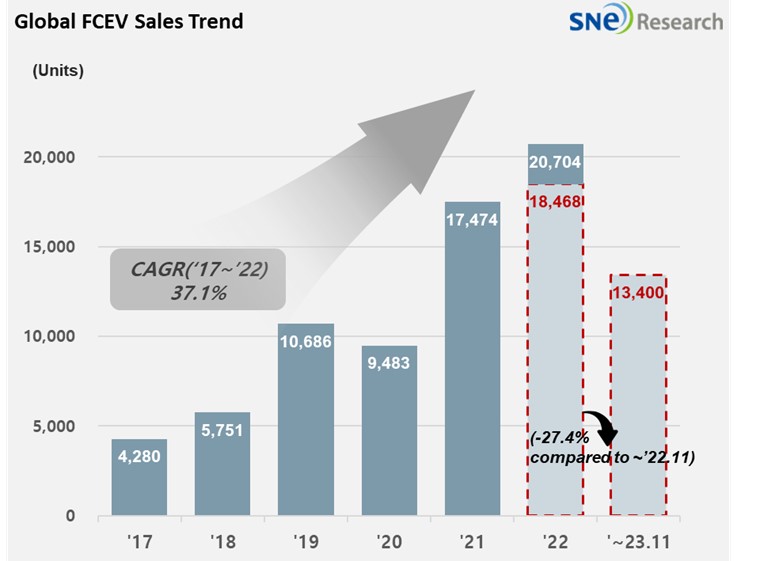From Jan to Nov 2023, Global FCEV Market with a 27.4% YoY Degrowth
- Hyundai Motor Group took up 36.4% of the global FCEV Market
A total number of globally registered FCEVs sold from Jan to November in 2023 was 13,400 units, recording a 27.4% YoY degrowth.

(Source: Global FCEV Monthly Tracker – December 2023, SNE
Research)
By company, Hyundai Motors sold 4,881 units of NEXO and ELEC CITY, remaining at the top on the list with its 36.4% of market share. While Hyundai saw 10,700 units of NEXO sold in the same period of last year, taking up the overwhelmingly big market share, but this year it only saw 4,601 units of NEXO sold, a 55.0% YoY decline. On the other hand, the sale of Toyota Mirai enjoyed a 13.5% YoY growth from 3,238 units to 3,678 units. The Chinese companies have been in an upward trend, mostly focusing on the commercial vehicle market.

(Source: Global FCEV Monthly Tracker – December 2023, SNE
Research)
By country, due to the impact from declining sales of NEXO, Korea experienced a 54.1% YoY decline in sales. Chia recorded a continuous growth mainly in hydrogen commercial vehicles, taking the top position not only on the list of global EV market share but also the FCEV vehicle market share. The US, where Toyota’s Mirai with a YoY growth was sold most, also recorded a growth.

(Source: Global FCEV Monthly Tracker – December 2023, SNE
Research)
Since
2018, when Hyundai first unveiled NEXO, the global FCEV market continued to be
in an upward trend with the global annual sales exceeding 20,000 units, but the
2023 FCEV market is expected to close with overall degrowth throughout the
year. The major reason for such degrowth is that the FCEV sales in Korea, which
took up the biggest market share, significantly dropped more than by half
compared to the same period of last year. Since 2018, the NEXO model only had two
facelift models in 2021 and 2023, offering a limited option to consumers. In addition
to that, due to the increasing charging cost of hydrogen car, defective
hydrogen incidents, and hydrogen charging infrastructure shortage, it has
become inevitable for FCEVs to lose its lusters in the eco-friendly vehicle
market. On the other hand, the Chinese government has been accelerating the commercialization
of hydrogen energy in China by actively expanding the distribution of hydrogen
cars and establishing the related infrastructure through the China’s Medium and
Long-Term Strategy for the Development of the Hydrogen Industry (2021-2035). The
Chinese government has rapidly expanded its FCEV market share by taking
advantage of its hydrogen commercial vehicle market. While it is expected that
hydrogen commercial vehicles would be one of the major parts of hydrogen economy
in future, attentions should be paid to changes in the landscape of competition
between major companies who invest in the fuel cell system.

